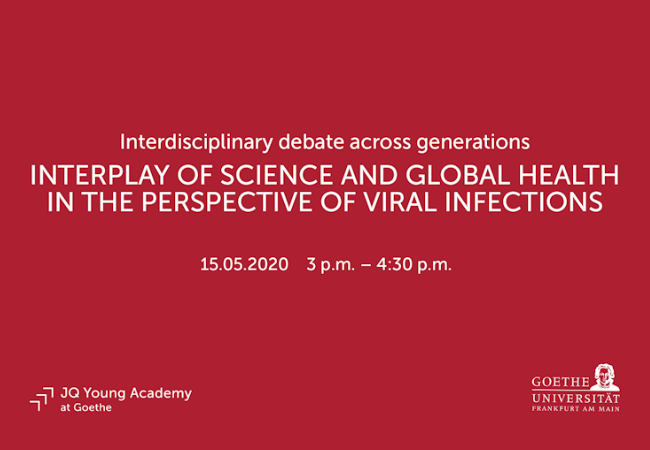
Global health concerns us all. So does scientific progress, yet less immediate. The current worldwide corona pandemic has a tremendous impact on all aspects of our lives. Life scientists, social scientists, economists, physician and policymakers join up to initiate new projects in a short time. The Johanna Quandt Young Academy wants to debate with two scientists from different “generations” about various aspects of how the worldwide health situation and the scientific progress influence each other from the viewpoint of viral infections.
The Johanna Quandt Young Academy invites an interdisciplinary audience to a discussion across skills and generations about the Interplay of science and global health in the perspective of viral infections. The scientists and students of Goethe University from all conceivable disciplines are encouraged to participate.
The interdisciplinary debate will take place online on May 15, 2020, from 3 p.m. to 4.30 p.m. Registration: http://jqya.de/event/research-and-global-health/. Digital format: participants will receive a Zoom-link upon registration with a separate email
Speakers
Kai Simons is a professor of biochemistry and cell biology and director emeritus at Max-Planck-Institute for Molecular Cell Biology and Genetics in Dresden. Kai started investigating viruses in the early 70th, focusing on the biological membranes. For his impressive lifetime achievements, he was awarded the Robert Koch Medal in Gold in 2016. Kai Simons found clear evidence that many viruses – including influenza, Ebola, measles and HI viruses – use lipid rafts to invade their host cells or to leave them again, by encasing themselves with rafts from the cell membrane. In addition to his scientific work, Kai Simons has vast experience in science policy and is committed to the promotion of young scientists and women in his field. His goal is to strengthen cooperative research collaboration.
Christian Münch is an Emmy-Noether-Programme Group Leader at the Gustav-Embden Centre of Biochemistry at Goethe University. Christian has been working on protein quality control in mitochondria, determining the processes involved in the mitochondrial unfolded protein response and its role in human diseases. Dr Münch was awarded an ERC starting grant in 2018 and an Aventis Foundation Postdoctoral Award in 2019. With the onset of the corona pandemic, Christian has been significantly involved in the coronavirus related research and will present recent results.








